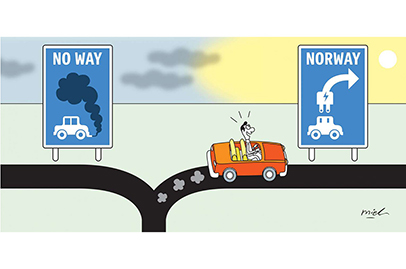Is going electric the road ahead for cars here?
Is going electric the road ahead for cars here?

 As a small island with short driving distances, Singapore has a practical set-up for electric cars, which are better for the environment than carbon-emitting petrol-fuelled ones.
As a small island with short driving distances, Singapore has a practical set-up for electric cars, which are better for the environment than carbon-emitting petrol-fuelled ones.
Yet it has only 127 "green" cars - 124 plug-in hybrid vehicles (PHEVs) and three battery- powered electric vehicles (EVs) - registered for use. They make up just 0.02 per cent of the 600,000-plus cars here.
One of those electric vehicles hit the headlines earlier this year, highlighting the hurdles that environment-conscious motorists face if taking the petrol-less road less travelled.
When Mr Joe Nguyen, 44, the vice-president of an Internet research firm, imported a used electric-powered Tesla, it was slapped with a $15,000 tax surcharge under the Carbon Emissions-Based Vehicle Scheme (CEVS) after undergoing tests by the Land Transport Authority (LTA).
Since then, two other Teslas have come to Singapore. They were given rebates of $10,000 and $15,000. Mr Nguyen has said he would write to his MP to get his car re-tested.
Yet, EV ownership is rising in other countries, most noticeably in Norway, which has the highest market penetration of green vehicles. About 15 per cent of new cars registered in Norway are EVs.
If plug-in hybrid vehicles are added in, this rises to one in every three, or 30 per cent, of new cars. PHEVs run on batteries which can be recharged with an electrical socket, but they also have a conventional engine to take over as a back-up.
What is the key to Norway's electric car popularity, and what are the lessons for Singapore?
CASE STUDY: WHAT SWAYED A CAR BUYER
Mr Mindaugas Zilys, 32, a postman who lives in Honefoss, about an hour's drive north-west of the capital Oslo, paid 585,000
Norwegian kroner (S$99,000) for his Tesla Model S two years ago.
This works out to be similar to or slightly cheaper than a comparable fossil fuel car in its class.
What led Mr Zilys to pick the Model S - which is Tesla's luxury sedan - was not exactly pro-environment zeal, but rather the fact that the Norwegian government introduced a slew of incentives to make the electric vehicle more attractive.
The Model S, for example, apparently gets a huge tax exemption of around US$135,000 (S$187,700), owing to a policy of no purchase/import and value-added tax for zero-emission cars. Another significant economic incentive is savings on petrol, which is expensive in Norway. Mr Zilys figured he would save about 30,000 kroner each year, compared with using a combustion-engine car.
"Over seven years, I would save about 210,000 kroner. I will not buy a petrol car any more - driving an electric car is way more fun," Mr Zilys told The Straits Times.
Other benefits for EV owners include free municipal parking, access to bus lanes and a low annual road tax.
No wonder, then, that out of the 2.6 million passenger cars in Norway, about 120,000 of them are EVs and PHEVs, accounting for about 4 per cent.
LURE OF TAX SWEETENERS
Electric vehicles do not enjoy instant tax rebates in Singapore, unlike in Norway.
However, Mr Petter Haugneland, communications manager with the Norwegian Electric Vehicle Association, when asked about lessons for Singapore, pointed to the success of the measure in his country. He said during an interview in Oslo last month: "To boost the uptake of EVs, you have to look at the tax system for cars. That was the most effective measure in
Norway's case."
How much cheaper is an electric vehicle in Norway? Mr Haugneland gave the example of the Volkswagen Golf. In Sweden, the electric version costs 98 per cent more than the fossil fuel equivalent, but in Norway, it is 1 per cent cheaper, thanks to the massive tax exemptions for EVs.
The use of EVs is also encouraged, from no charges on toll roads or ferries, and access to bus lanes.
The latter proved so successful in Oslo, such that buses became slowed down by EVs. Mr Haugneland said it was later mandated that for EVs to use bus lanes, drivers had to ferry other passengers - in other words, carpool.
But the benefits will not last forever. The zero tax incentives will continue to 2020 and then be reviewed and adjusted, depending on the market developments.
Still, tax rebates are, ultimately, "funded" by taxpayers.
In Norway, the tax subsidies and other financial benefits given to EV owners brought about a projected tax shortfall of two billion kroner last year, according to a Reuters report in May that year.
EV proponents argue, however, that the cleaner air and reduced pollution is something that one cannot put a price on.
And, monetary issues aside, experts point out that conditions in Singapore are conducive for EVs.
Motorists here clock an average daily mileage of over 50km in their cars. The range of an EV today, on a single charge, is upwards of 100km.
Extreme cold temperatures can also diminish battery performance, so this concern is less relevant here.
BROADER ENVIRONMENTAL GOALS
In April, Singapore signed the Paris Agreement on climate change, setting a bold target to reduce its emissions intensity by 36 per cent from 2005 levels by 2030.
Dr Sanjay C. Kuttan, from the Nanyang Technological University's Energy Research Institute, sees a move to more EVs - cars and buses - as one of the ways to achieve that goal.
And he reckons there is no better time than now to ramp up its adoption.
He notes the Government's plan for an islandwide car-sharing programme - to be launched by the middle of next year - as a key "step forward".
The initiative, called BlueSG, will see 2,000 charging points being built, of which 20 per cent will be available for public use.
Motorists can avail themselves of 1,000 electric cars under the 10-year initiative.
"We have already committed to more EV infrastructure than we have cars on the road. We are actually now short on cars," he said, adding that one charging station can support as many as four cars.
But there needs to be a further push to "level the playing field" between fossil fuel cars and EVs, so both are given a chance to succeed equally in the market, he said.
CARBON REBATES DEBATE
Another area that lacks a level playing field is the calculation of carbon rebates.
Under the LTA's CEVS, CO2 emissions for electric cars are derived from a grid emissions factor. This takes into account the amount of CO2 produced from power plants to generate the electricity EVs use.
But CO2 emissions for petrol and diesel cars are based solely on tailpipe emissions.
Dr Kuttan said this disadvantages EVs: "I don't think they have done the maths on an apple-to-apple basis. In the carbon emission calculations for fossil fuel cars, they don't calculate the production of the fuel and the transportation from refinery to petrol station."
This was pointed out in a white paper study led by Dr Kuttan, published in August by the Sustainable Energy Association of
Singapore (Seas), and which proposed other tweaks to the CEVS.
In the top band of A1 - cars that produce from zero to 95g of CO2 per kilometre - a rebate of $30,000 is given.
But with more differentiation within the band, there is room for low or zero-emission cars to be given more incentives.
The white paper also suggested changes to the Building and Construction Authority code to ensure that new buildings all have space provisions for EV charging infrastructure, and for bus fleets to go electric.
OVERSTATING THE BENEFITS?
But not all experts are convinced that having more EVs is a good idea, because the "benefits" also depend on how power plants produce electricity.
In Norway, where around 99 per cent of the electricity supply is generated from hydropower, having more EVs is a no-brainer.
But SIM University senior lecturer Park Byung Joon said: "In Singapore, most of the electricity is generated from natural gas. While natural gas is far less environmentally damaging than coal, it is still a fossil fuel."
Dr Park also questioned whether EV batteries - which contain toxic chemicals and heavy metals - are good for the environment. He said there is a lack of research on the "life-cycle assessment" of an EV's environmental footprint, "from the manufacturing process, while the product is used, and when it is disposed off".
THE WAY FORWARD
Adapting Norway's road map to the electrification of its vehicles, may not be ideal, considering the underlying cost of
increased tax incentives, and that Singapore's electricity generation is not entirely clean.
Reworking the CEVS is a sound suggestion. And in its car-lite push, the Government is heading in the right direction by test-bedding EV use in fleets, such as the car-sharing initiative, and an e-taxi pilot with 100 cabs, that is now progressively rolling out.
Whether they harm the environment more than save it is debatable, but EVs perhaps have a bigger future to play in autonomous shared-usage services - self-driving taxis, pods, and buses. In those applications, they carry more people at a go, and can be more efficiently deployed - upping their environmental quotient.
The following article is written by Adrian Lim, Correspondent with The Straits Times.


3 Comments
Recommended Comments
Create an account or sign in to comment
You need to be a member in order to leave a comment
Create an account
Sign up for a new account in our community. It's easy!
Register a new accountSign in
Already have an account? Sign in here.
Sign In Now